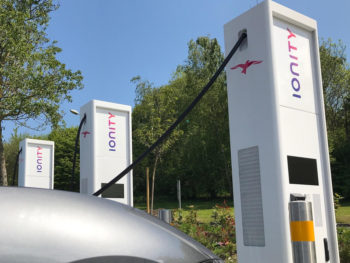‘Serious lack’ of electric charging points in EU, says ACEA
Most EU member states have a “serious lack” of electric charging points along the road networks, impeding EV take-up.

ACEA has reiterated its concerns that drivers will not be able to switch to EVs if there are not enough charging and refuelling stations along the roads where they drive
So say the European Automobile Manufacturers’ Association (ACEA) as it publishes data showing that 10 countries have less than one charger for every 100 kilometres of key roads.
Its findings also show that 18 EU member states have under five charging points per 100km of road, and just four have more than 10 chargers for each 100km of streets.
And it’s calling for action as it says the lack of charging will undermine the EU’s rapidly accelerating plans for electric vehicles.
Under the ‘Fit for 55’ climate package published in July, the European Commission proposed that by 2030 CO2 emissions from new cars should be 55% less than 2021 levels – this would effectively mean a sales ban of combustion engine vehicles in the EU.
But ACEA said this will not be possible without a major ramp-up on work to deploy charging.
“Consumers will not be able to make the switch to zero-emission vehicles if there are not enough charging and refuelling stations along the roads where they drive,” cautioned ACEA director general, Eric-Mark Huitema.
“For instance, if citizens of Greece, Lithuania, Poland and Romania still have to travel 200km or more to find a charger, we cannot expect them to be willing to buy an electric car,” explained Huitema.
“Massive progress on infrastructure deployment will have to be made across the EU in a very short timeframe. The advances made in a few Western European countries are encouraging, but should not distract us from the dire state of the charging network in other EU countries.”
The association also said the proposal for an Alternative Fuel Infrastructure Regulation – also a component of the Fit for 55 package – is out of sync with the Commission’s ambitions for the CO2 targets. The regulation would Member States to expand charging capacity in line with zero-emission car sales, and to install charging and fuelling points at regular intervals on major highways: every 60km for electric charging and every 150km for hydrogen refuelling.
But Huitema said this is not enough, adding: “While we appreciate the introduction of much-needed binding targets for charging and refuelling stations in each member state, they will need to be strengthened significantly if we want to meet our climate goals.”
ACEA added that it’s calling on the European Parliament and the Council to ensure the right conditions for e-mobility are put into place during the upcoming negotiations on Fit for 55.

